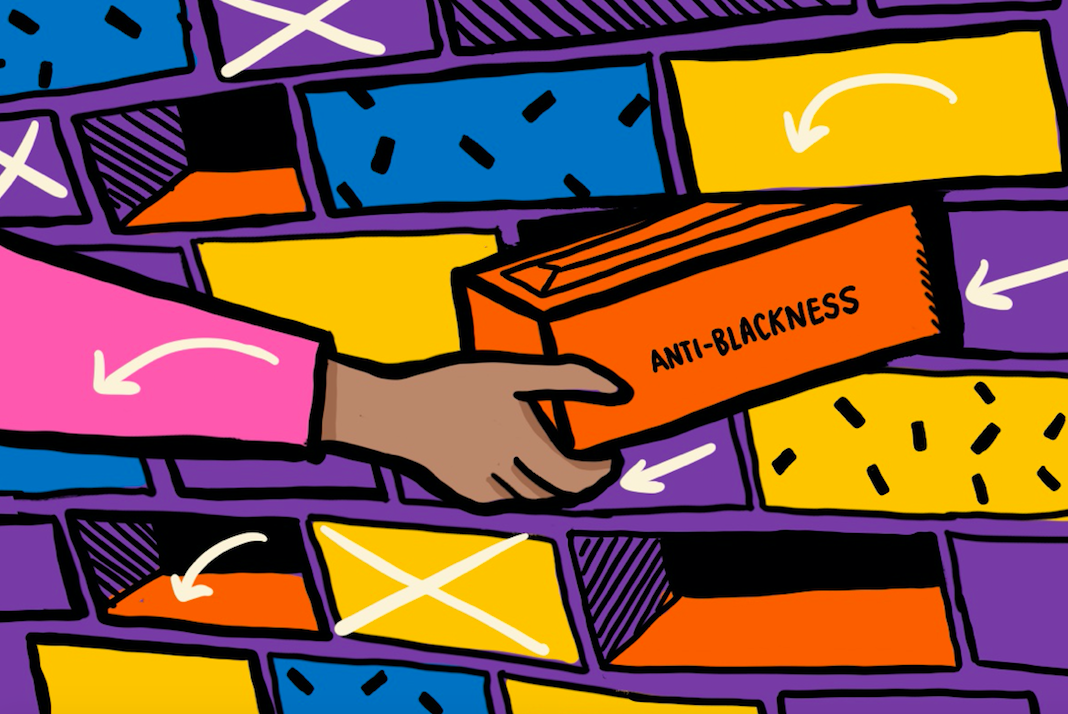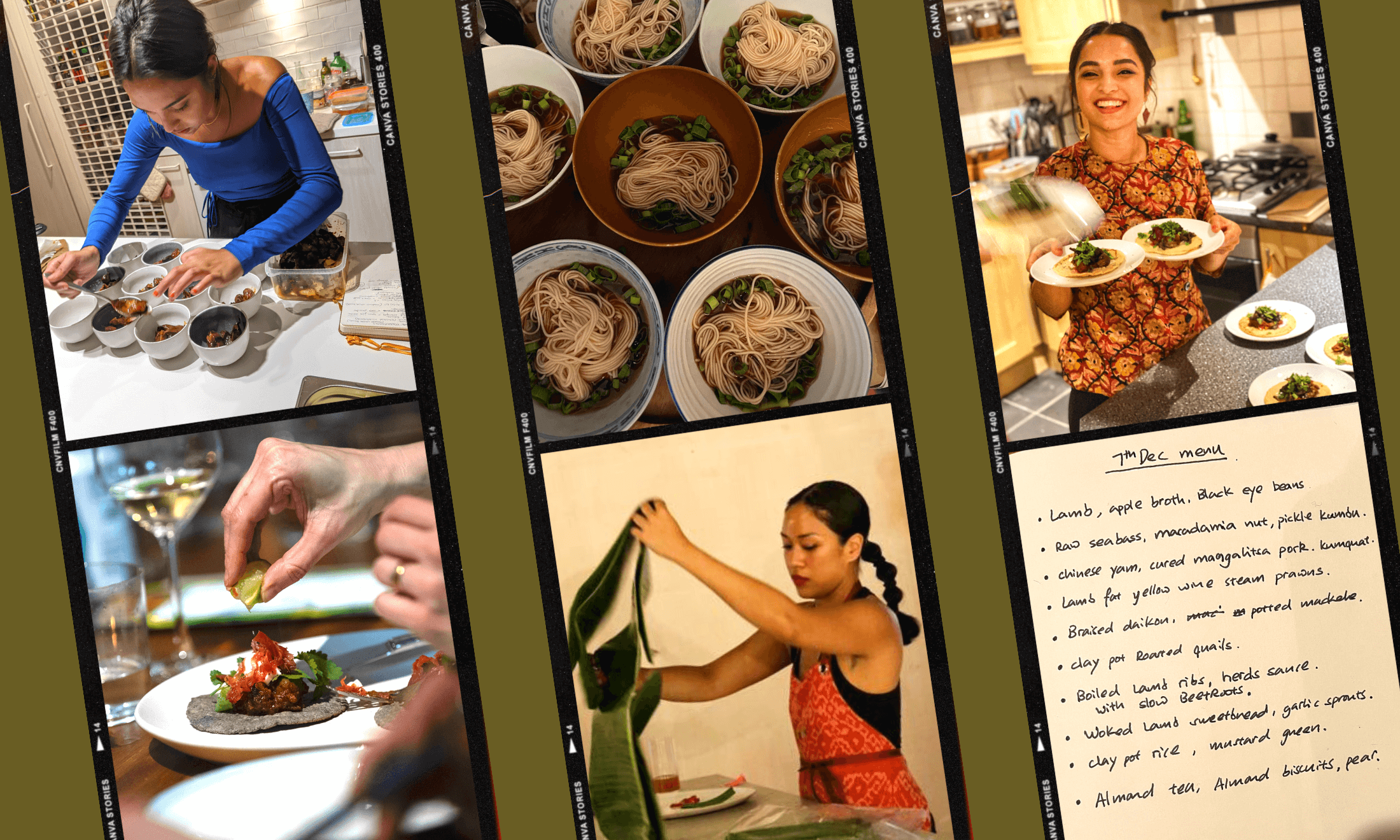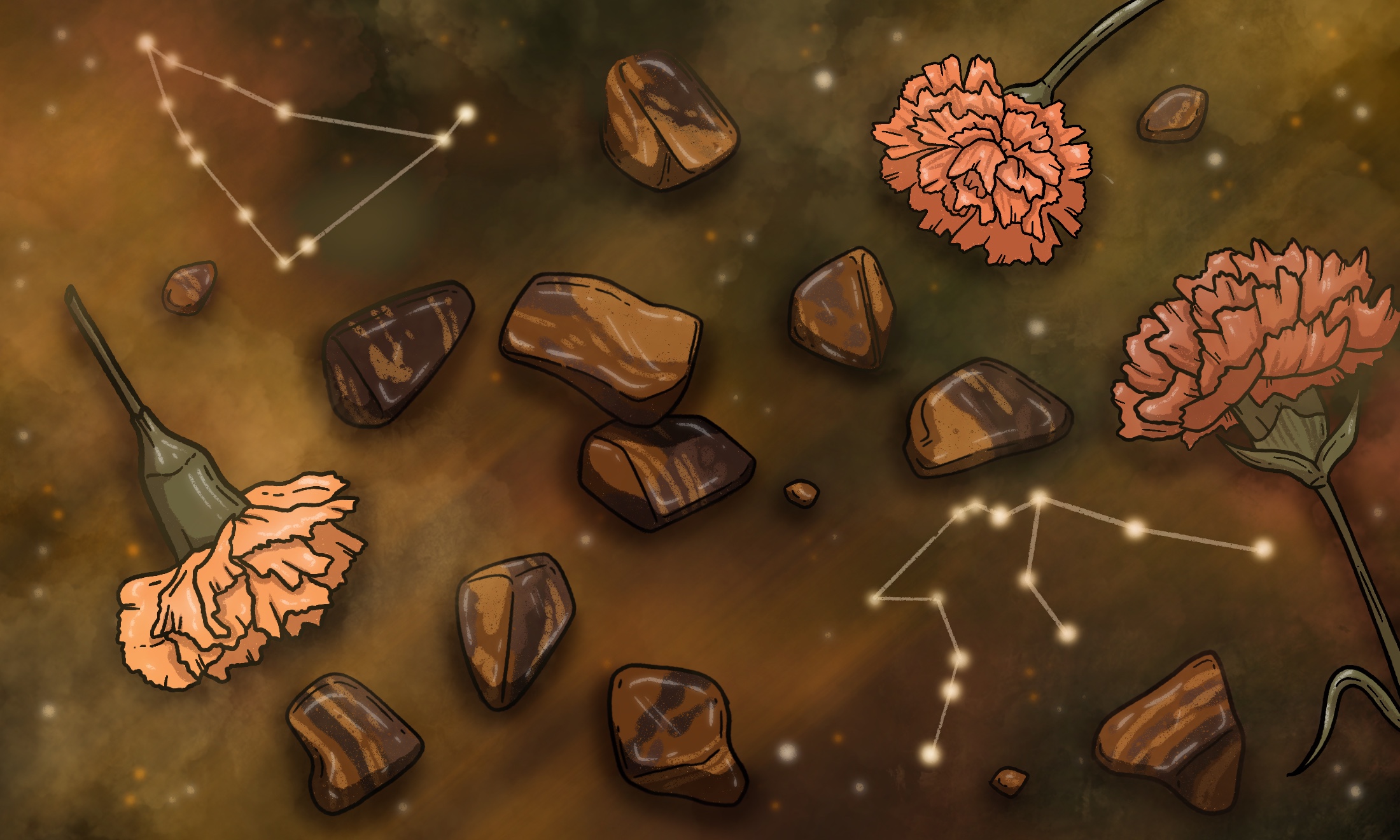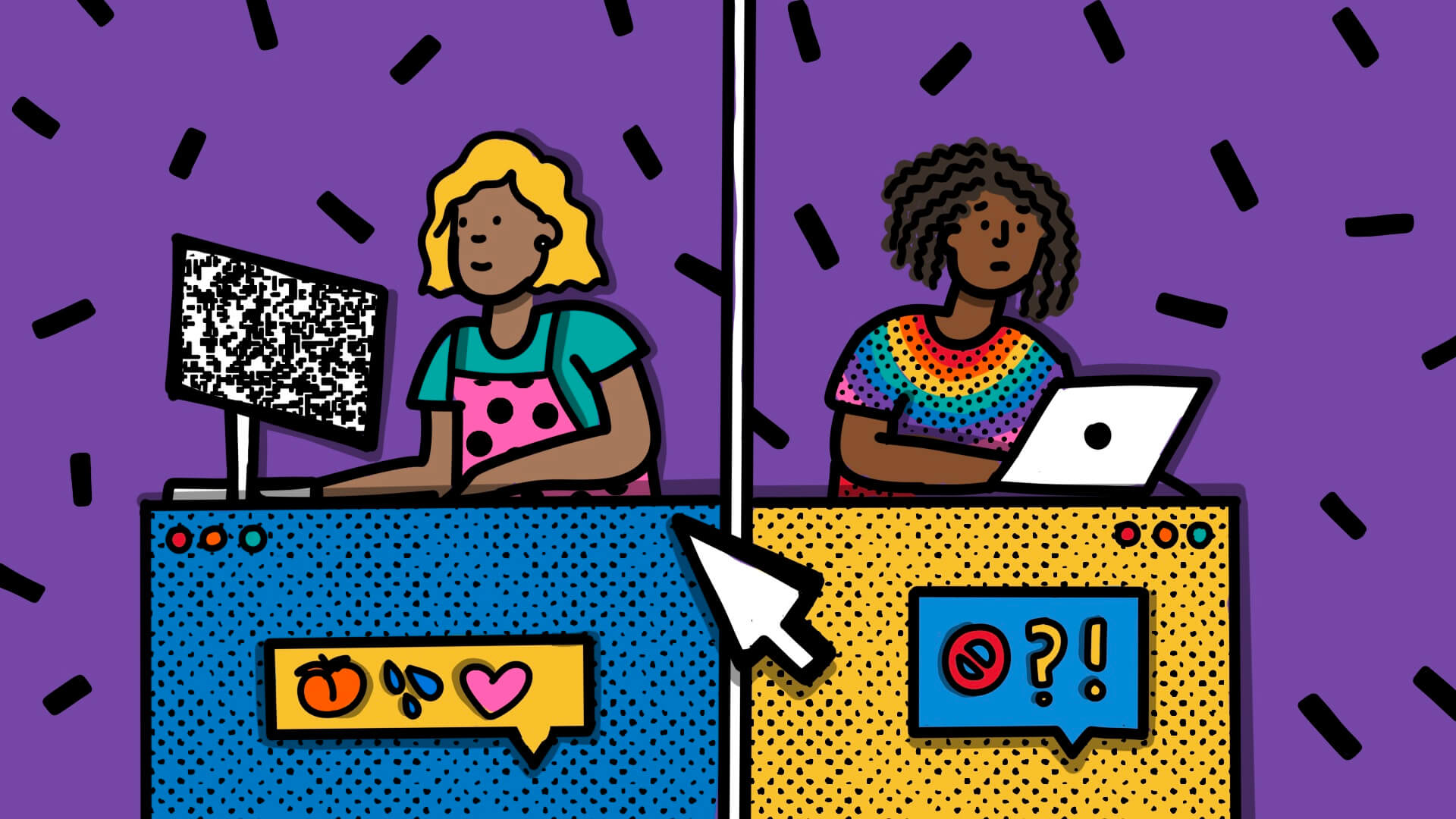
Queeries: how can I, as a non-black person of colour, help dismantle anti-blackness?
Fagony Aunt Aisha Mirza answers your queeries about QTIBPOC life. This month, they discuss how to be a better ally to your black friends.
Aisha Mirza
12 Jun 2020
Illustration by Soofiya
“I’m embarrassed to admit that anti-blackness is kind of a new concept to me. I only really thought of things in terms of white people and the rest of us but I get that it’s more complicated than that. I’m feeling unsure about my place in all this and how to move forward or make a change.“
Society at large has long relied on a hierarchy of race that positions white people at the top and black people at the bottom. The rest of us are floating in between, meaning that all non-black people of colour have closer proximity to whiteness, which we have benefitted from and used to survive at the expense of black people for centuries. In the same way that every white person is an agent of white supremacy, every non-black person of colour is an agent of anti-blackness and therefore also an agent of white supremacy. To be clear, every white person is inherently racist and every non-black person is inherently anti-black.
This might be news to you and that’s ok. Now is an opportunity to learn, unlearn, and work on the parts of yourself that may want to resist this truth, so you can fight. Unfortunately, the proof is abundant. I’m thinking about those of us who have been praised for having fairer skin, and those of us who have been encouraged to scrub and bleach it. I’m thinking about those of us for whom bringing home a black partner would be chaos. I’m thinking about those of us who have ancestors who were slave owners and traders, and relatives who still are.
It’s important that as non-black people of colour, we learn, quickly, to frame ourselves not just as oppressed people but as oppressors too. We need to separate our experiences of racism and our trauma from that of black people’s, which is unique. It’s my hope that we can do this with grace and humility because we know what it’s like to have our realities debated and diminished. We know what it’s like for our calls to action to be met with roiling cries of “What about me!?” We don’t need to do 100 BuzzFeed quizzes on how to be a decent person, right?
“It’s important that as non-black people of colour, we learn, quickly, to frame ourselves not just as oppressed people but as oppressors too”
We can’t be complacent. Much like white people, brown people have consistently shown ourselves to be unsupportive, afraid and jealous of movements for black liberation, resisting framing that centres blackness and making arguments against the reality of anti-blackness by citing the fact that Beyoncé exists and other such distractions. All this, despite a long history of black and brown solidarity movements, and the fact that many civil rights pushes, instigated and held up by black thinkers and activists, allow other people of colour to participate in and benefit from them.
We need to be very careful not to let any feelings of defensiveness, guilt, fear or anger that arise as we delve deeper into our complicitness with white supremacy drown us. Yes, we will make mistakes. I’m talking from experience. And I get it, making mistakes is terrifying, especially for queer people and people of colour who are often held to the highest standards. It’s our responsibility to get on top of that fear though, and never allow it to become an excuse. Make space for those feelings. Unpack and thoroughly understand them with your therapist or a group of other non-black people; they are there for a reason and deserve to be held, heard and interrogated as all feelings do. But let’s do it with a view to action.
As the tide is turning on years and years of racist gaslighting from this Britain that thinks it’s so Great, we’re planting our feet and getting ready to tear down the structures that have kept us playing out some kind of colonial fantasy in one way or another since we were born. At a Black Lives Matter protest last week, I heard a young voice scream, “The UK is the colonial parent of the USA!” and realised that it was the first time I had ever been proud to stand on this land, this faltering backbone, this iron rod of imperialism.
The momentum we can feel right now will not always be available to us. They will try to crush us, as they always have. We have to show up on the quiet days too. We have to welcome and step into discomfort and actively redistribute our power, and sometimes it’s gonna feel shitty. We get to decide how we will infuse anti-racism and the liberation of black people into our day-to-day lives. This will look different for different people depending on their resources and capacity, but there’s something for everyone to be doing, and there are some things all of us can do.
Don’t conflate “people of colour” and our experiences, hardships and creations with those of black people. Always credit black ideas and people. Don’t steal from black culture. Acknowledge the ways we benefit from blackness and anti-blackness, not just in struggle but also in joy! Decolonise the way you use language – which words are our words to say? Listen actively and know when it’s not our time to have an opinion. Constantly challenge our colonised beauty ideals and work against the way that black femmes, particularly those with darker skin, are sexualised, fetishised and disregarded.
Protect and love black children. Watch the space we take up. Make space for black people to speak. Elevate and support black colleagues in the workplace. Pay black people well, buy from black people and redistribute our wealth. Check and educate our families. Gain consent before offloading. Use our privileged bodies as witnesses and shields when necessary. Keep it up. Do the work loudly but also quietly too. Expect nothing from anyone. And remember, together we are people of the global majority.
How can I best support my black friends?
“Witnessing so much violence against black people recently has been horrifying. As a queer person of colour, I’m struggling to work out how best to care for my black friends who I know are suffering, without being annoying or doing the wrong thing. If I’m honest, I’m tired too, but I want to help.“
The curtain is being pulled down quickly on an empire built entirely on the dehumanisation, exploitation, torture and murder of black people. It’s no coincidence that this uprising comes during a pandemic where we’ve seen working class black and brown people willfully offered up for death by the soulless capitalists that run this country. It’s a brutal, exciting, honest and painful time for all melanated people, but particularly for black people who have suffered and resisted in ways the rest of us will never know.
I read a quote once about how imagining a world without anti-blackness is almost impossible, because it would look so completely different from the world we live in. Anti-blackness, the specific type of racism black people face, is the lynchpin of society as we know it, and we have had enough. All non-black people should be asking ourselves how we can support the black people we love, but not just right now – always – and not just regarding our friends, but all black people.
Friends are important though, and a great place to start, because the abolition of anti-blackness, colonialism and all of its exports (prisons, psych wards, statues, colourism, the gender binary) will not be successful without continued, careful attention to the ways we care for each other and ourselves. I do think though that we don’t need to overthink this support. Your black friends were still black two weeks ago. You were still friends two weeks ago. They were still finding ways to survive in an anti-black society long before this wave of bitter-sweet attention, and what’s news to you now might not be to them.
“They were still finding ways to survive in an anti-black society long before this wave of bitter-sweet attention”
Queer and melanated people often have pretty well-established check-in protocols among friends, such as keeping tabs on who you haven’t heard from for a while, sitting quietly beside each other and waiting for depressive episodes to pass, cooking for each other, housing each other, finding funds and resources for each other when we’re in need, and jokes. We’ve built these frameworks because they were necessary for us to survive. What were the ways you had established with your black friends to show love before this moment? Do that. Let them know you’re available for and responsive to whatever might feel good for them. Send them something nice to help ease the trauma of right now, and then keep it moving.
I understand the fear of doing or saying something wrong, and it’s a beautiful thing to be sensitive to people’s needs, but this can also result in a walking-on-eggshells type energy which can be exhausting for everyone involved. That said, there are general good-practice tips for checking in with friends, which can always be useful when we’re feeling a little unsure.
Don’t make assumptions about how your friends are feeling, whether they want to talk or what they want to talk about. Black people are not a monolith and will be having a tremendous range of emotional responses to what’s happening in the world. There is also a strong chance they may not want to talk with you about blackness right now. Leave space for all realities and don’t dehumanise your pals.
“This is definitely not a time to be hitting up random black people that you admire or want validation from”
Ask specific questions such as “How are you feeling this afternoon?” or “Would it be helpful if I drafted that email for you?” or “How are you sleeping?” rather than just “How are you?”. You might also want to challenge yourself to intuit what they need, using their verbal cues, body language and the things you know about them, and do something (non-invasive) without asking such as making them a playlist or dropping some food off. If your friends do want to talk with you, be careful not to police or debate their reactions, stories, rage or grief. You are offering to hold space for an experience that is very real and that you will never understand. Hold it with care.
All of this stuff can be done within your capacity and it’s a good thing to be honest with yourself regularly about what you can offer; self-compassion is important, always. Maybe you’re grieving, overworked or understandably tired. You can acknowledge that and work within your limits without making the interaction about you. It’s crucial too to check in with yourself about intention. Are you reaching out from a genuine place of care, or are you feeling guilty, confused or curious and looking for a black person to educate you or hold that for you?
Know who your friends are and keep it local. This is definitely not a time to be hitting up random black people that you admire or want validation from. The time to do that is never. This is the time, however, to educate yourself and commit to a lifetime’s work of learning how to care for and centre blackness way beyond individual interactions. Right now, unlearning your own anti-blackness is the most revolutionary thing you can do.
This column contains very little original thought and relies heavily on years of labour, language and activism led by black and brown elders and black Twitter.
Upcoming meetings and teach-ins:
South Asians in Defense of Black Lives: In Conversation with Zoé Samudzi (12 June)
How Non-Black People Can Be Allies and Challenge Anti-Blackness by Malikah (13 June)
Calling Whatsapp: Our Role in Black Liberation Movements by Equality Labs & South Asians 4 Black Lives (13 June)
Acceptance & Allyship: A Guide to Showing Up (16 June)
Further reading and resources:
Resources for unlearning white supremacy & practicing solidarity in anti-racist work to disinvest from anti-blackness (especially for UK-based South Asians)
Letters for Black Lives (translations included)
Asia-Art-Activism in Solidarity with Black Lives Matter
South Asian Solidarity – BLM (organising group on Facebook)
Handbook for educating on anti-blackness in South Asian communities (work in progress)
Talking to your Asian immigrant family about race (translations included)
Addressing Anti-Blackness Within the Vietnamese/Chinese & Asian Community
Non-Black Latinx Resources on Anti-Blackness
Multi-language terms for addressing anti-blackness and systemic racism
North Africans for Black Lives
Understanding Anti-Black Racism: A Guide for Egyptians
Yellow Jackets Collective
Six Ways for Arabs to Resist Anti-Blackness
By Us For Us Collective
Free copy of CherishXAbolish
Arabs for Black Power: A Reading List for Non-Black Arab Allies
The Afro-Iranian Community: Beyond Haji Firuz Blackface, the Slave Trade, & Bandari Music








